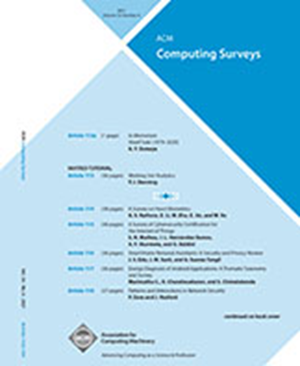Out-of-Distribution Data: An Acquaintance of Adversarial Examples - A Survey
IF 28
1区 计算机科学
Q1 COMPUTER SCIENCE, THEORY & METHODS
引用次数: 0
Abstract
Deep neural networks (DNNs) deployed in real-world applications can encounter out-of-distribution (OOD) data and adversarial examples. These represent distinct forms of distributional shifts that can significantly impact DNNs’ reliability and robustness. Traditionally, research has addressed OOD detection and adversarial robustness as separate challenges. This survey focuses on the intersection of these two areas, examining how the research community has investigated them together. Consequently, we identify two key research directions: robust OOD detection and unified robustness. Robust OOD detection aims to differentiate between in-distribution (ID) data and OOD data, even when they are adversarially manipulated to deceive the OOD detector. Unified robustness seeks a single approach to make DNNs robust against both adversarial attacks and OOD inputs. Accordingly, first, we establish a taxonomy based on the concept of distributional shifts. This framework clarifies how robust OOD detection and unified robustness relate to other research areas addressing distributional shifts, such as OOD detection, open set recognition, and anomaly detection. Subsequently, we review existing work on robust OOD detection and unified robustness. Finally, we highlight the limitations of the existing work and propose promising research directions that explore adversarial and OOD inputs within a unified framework.分布外数据:对抗性例子的认识-一项调查
在实际应用中部署的深度神经网络(dnn)可能会遇到分布外(OOD)数据和对抗性示例。这些代表了不同形式的分布转移,可以显著影响深度神经网络的可靠性和鲁棒性。传统上,研究将OOD检测和对抗性鲁棒性作为单独的挑战来解决。本调查的重点是这两个领域的交集,考察研究界如何将它们结合在一起进行调查。因此,我们确定了两个重点研究方向:鲁棒OOD检测和统一鲁棒性。稳健的OOD检测旨在区分分布内(ID)数据和OOD数据,即使它们被对抗性地操纵以欺骗OOD检测器。统一鲁棒性寻求一种单一的方法来使dnn对对抗性攻击和OOD输入都具有鲁棒性。因此,首先,我们建立了一个基于分布转移概念的分类法。该框架阐明了鲁棒性OOD检测和统一鲁棒性如何与其他研究领域解决分布变化问题,如OOD检测、开放集识别和异常检测。随后,我们回顾了现有的鲁棒OOD检测和统一鲁棒性方面的工作。最后,我们强调了现有工作的局限性,并提出了在统一框架内探索对抗性和OOD输入的有前途的研究方向。
本文章由计算机程序翻译,如有差异,请以英文原文为准。
求助全文
约1分钟内获得全文
求助全文
来源期刊

ACM Computing Surveys
工程技术-计算机:理论方法
CiteScore
33.20
自引率
0.60%
发文量
372
审稿时长
12 months
期刊介绍:
ACM Computing Surveys is an academic journal that focuses on publishing surveys and tutorials on various areas of computing research and practice. The journal aims to provide comprehensive and easily understandable articles that guide readers through the literature and help them understand topics outside their specialties. In terms of impact, CSUR has a high reputation with a 2022 Impact Factor of 16.6. It is ranked 3rd out of 111 journals in the field of Computer Science Theory & Methods.
ACM Computing Surveys is indexed and abstracted in various services, including AI2 Semantic Scholar, Baidu, Clarivate/ISI: JCR, CNKI, DeepDyve, DTU, EBSCO: EDS/HOST, and IET Inspec, among others.
 求助内容:
求助内容: 应助结果提醒方式:
应助结果提醒方式:


